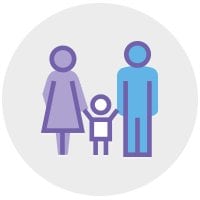Diabetes and Family History: How Much Risk is Genetic?
Whether you have Type I or Type II diabetes, there are several factors that could have contributed to the disease. Among these are your family’s lifestyle and your genetic history. By gaining a better understanding of these two issues, you may be able to control your diabetes with more ease, or possibly (in the case of Type II) avoid it altogether. At the very least, understanding the risks created by your genetic and family history will allow you to detect diabetes earlier and avoid the damage it can do if left untreated.
How Family Affects Diabetes Risk
Your family affects your diabetes risk in two different ways. First, of course, your parents contributed to your genetic heritage. But there’s also the way your parents, your siblings, and your extended family may have influenced the way you eat, exercise, and care for yourself, because these are habits you learn from the people around you as you grow up. Your genetic makeup can play a big role in both Type I and Type II diabetes, while the way a family cares for itself and the habits you’re taught in regard to diet and exercise are generally more related to Type II risk.
To help prevent Type II diabetes if you don’t have the disease yet or if you’re prediabetic, there are four questions the NIDDK suggests you ask your family. These are:
- Does anyone in your family have Type II diabetes and if so, who are they?
- Has anyone in your family been told they may develop diabetes or are at risk for it?
- Has anyone in your family been told they need to get more exercise or lose weight in order to prevent diabetes?
- Did your mother have diabetes when she was pregnant, either with me or with a sibling?
Type II diabetes can be greatly affected by the lifestyle a family lives. As you grow up and get older you learn a lot of habits from your family. If these are bad habits—if you don’t see the people around you exercising, eating healthy food, or maintaining a healthy weight, the odds are higher that you will also struggle with obesity, and find yourself at risk for Type II diabetes and the complications that come with it.
By making healthy changes to your weight, diet, and exercise levels, you can reduce the chances of getting Type II diabetes and even reverse it if you already have it. But your family history is important, and asking the right questions can help you make better choices for the future.
Type I diabetes doesn’t have the same kind of relationship to self-care, eating habits, weight, and exercise. It develops in childhood, usually from an autoimmune response that attacks the cells that produce insulin, making it difficult or impossible for the body to process sugar. There’s nothing about how much a person weighs, what they eat, or how much they exercise that will reverse or reduce the risk of Type I diabetes. Still, while staying healthy won’t cure Type I, being aware of the health habits you inherited from your family may help you stay healthier over time.
Genetic Traits and Diabetes Development
Diabetes can come from genetics, just like it can come from family habits. But this is more often a factor in Type I diabetes. If you have family members who have Type I, your risk goes up simply because you carry the same or similar genes. If you or your child has this genetic heritage, be sure to let your doctor know. Make sure, too, that you’re keeping an eye on blood sugar levels and looking out for other symptoms. If you do develop diabetes, then at the very least your family history should allow you treat this illness as soon as it happens, potentially preventing some of the worst complications.
At the same time, understand that having parents or other family members with diabetes, even if both parents or a sibling have the condition, does not guarantee you’ll develop it. This is true for both Type I and Type II diabetes. When an identical twin has Type I diabetes, for example, the American Diabetes Association states that the other twin will only have it a maximum of 50% of the time. When a twin has Type II diabetes, the risk to the other twin is no higher than 75%. It is clear that genetics play a role, but there are factors you can control that will reduce your risk, too.
While you’re not guaranteed to get diabetes if your family has it, and some people with no obvious risk factors still develop it, paying attention to your genetic profile can help you avoid or reduce problems with diabetes and other chronic health conditions. When you address your lifestyle and remain mindful of your genetics, you have the opportunity to take better control of factors you can change, and that can make a big difference for your long-term health and well-being.
Diabetes can come from genetics, just like it can come from family habits.
About Diabetes
- Diabetes and Family History: How Much Risk is Genetic?
- Gestational Diabetes: What Is It, and What Causes It?
- Diabetes Symptoms, Diagnosis, & Testing
Diabetes Administration
- Diabetes Treatment and Care
- Diabetes: A School Guide for Effective Blood Sugar Management
- Diabetes: The Value of Just One Step
Diabetes Resources
Didn't Find the Answer You Were Looking For?
Find Affordable Diabetes Plans in Your Area
© 2017 YourDiabetesInfo.com All rights reserved.



